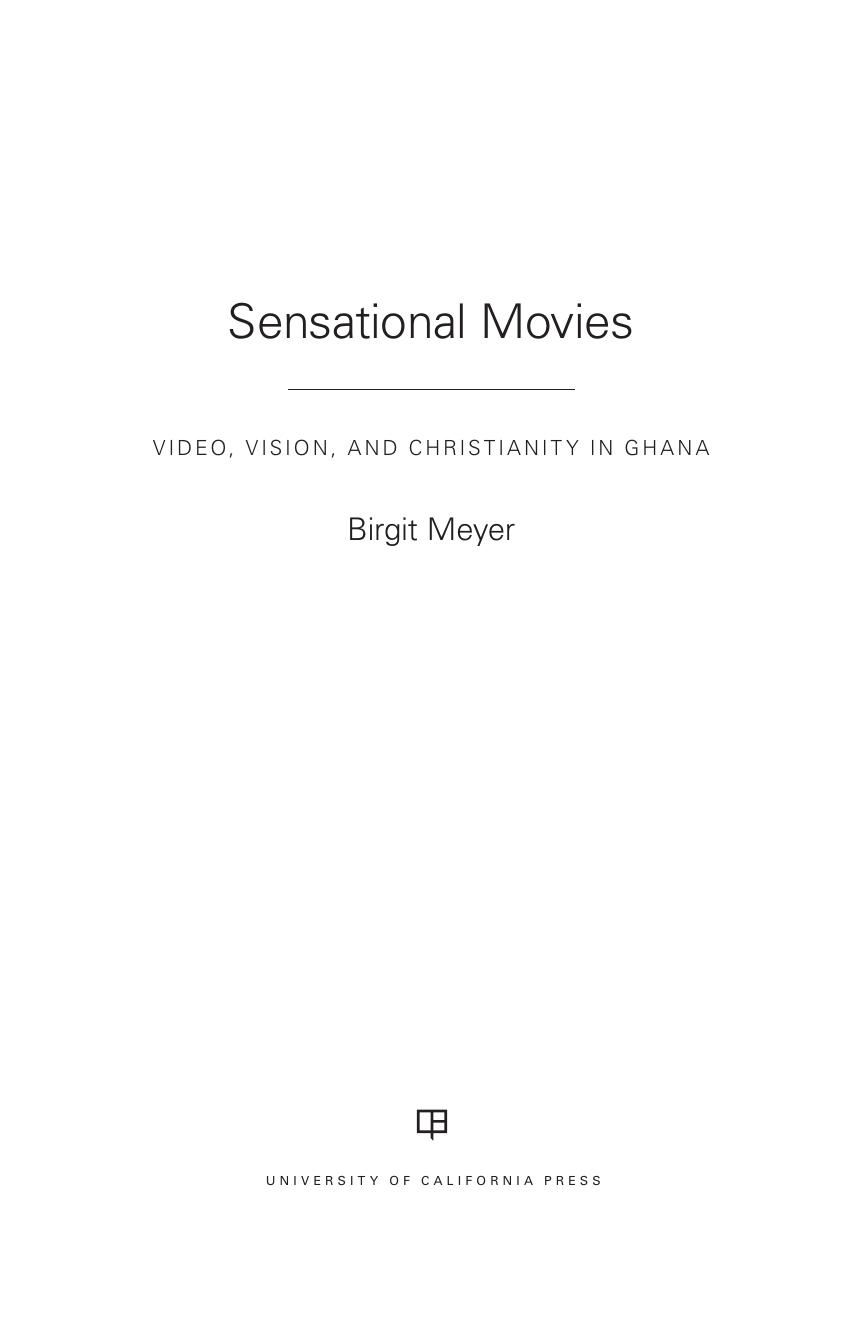Sensational Movies: Video, Vision, and Christianity in Ghana by Birgit Meyer

Author:Birgit Meyer
Language: eng
Format: epub, pdf
ISBN: 9780520287679
Publisher: University of California Press
EBSCOhost - printed on 12/8/2022 1:24 PM via . All use subject to https://www.ebsco.com/terms-of-use
FIVE
Picturing the Occult
As a format of representation, ârevelationâ called for the fabrication of compelling pictures displaying âoccultââand by implication evil, ugly, violent, and eroticâmatters that typify the âaesthetics of outrageâ (Larkin 2008, 184) mobilized in a great deal of Nigerian and Ghanaian video movies. In Europe the term occultâfrom Latin occultus: hidden, concealed, secretâis usually associated with magic, alchemy, and astrology.1 Along with the spread of missionary Christianity since the mid-nineteenth century, the term came to be used across Africa to refer to secret magical practices and demonized spiritual forces. Terence Ranger certainly had a point in warning against the danger inherent in recent anthropological studies that conflate âthe African occult into one sinister phenomenonâ (2007, 274). Still, I do not agree with his critique of such studiesâin particular of those in the framework of âoccult economiesâ and âthe modernity of witchcraftââfor inventing an âaggregated African occult.â For Ranger the notion of the occult is too generalizing and presentist to achieve insight into the modes through which various African societies grappled with questions of evil. Sharing his insistence on the importance of a historically grounded, ethnographically specific perspective, I think that it is the very historical process of aggregationâinvolving a recasting of specific spiritual entities under the banner of the occultâthat requires detailed attention (see also Meyer 2009b; Bonhomme 2012; Geschiere 2013, 11â12).
In southern Ghana, occult is a generic term central to popular discourse. Belonging to a long-standing and broadly shared, cross-ethnic regime of visibility grounded in the distinction between the dimensions of the physical and the spiritual, as well as in a rigorous dualism between good and evil, it is employed to refer to the machinations of the âpowers of darknessâ that are to be dragged into the âlightâ of Christianity (as well as of Sufist Islam; see Pontzen 2014). As a generic term, occult cuts across the specific names of spirits and gods known to various ethnic groups. Thriving within popular Christianity and supported by popular literature and movies, it is part of a generalizing vocabulary that transcends, but at the same time contains, specific indigenous notions and terms to refer to invisible forces that are perceived as dangerous and uncanny. This vocabulary should not be dismissed as a problematic misrepresentation of a diverse set of locally grounded ideas but instead should be taken as an evolving âmode of speakingâ (in the Saussurean sense of parole) that encompasses and cuts across cultural and religious specificities throughout Africa and the world at large. Ghanaian and Nigerian movies deploy this global mode of speaking, vesting it with pictures, and it is one of the main concerns of this book to unravel it.
How are we to represent and write about occult forces that are real to people in Africa but not necessarily to the anthropological researcher? Under the guiding phrase âoccult economies,â over the past twenty years narratives about the occult have primarily been analyzed as metaphors, as
Download
Sensational Movies: Video, Vision, and Christianity in Ghana by Birgit Meyer.pdf
This site does not store any files on its server. We only index and link to content provided by other sites. Please contact the content providers to delete copyright contents if any and email us, we'll remove relevant links or contents immediately.
Shoot Sexy by Ryan Armbrust(17728)
Portrait Mastery in Black & White: Learn the Signature Style of a Legendary Photographer by Tim Kelly(17006)
Adobe Camera Raw For Digital Photographers Only by Rob Sheppard(16976)
Photographically Speaking: A Deeper Look at Creating Stronger Images (Eva Spring's Library) by David duChemin(16687)
Bombshells: Glamour Girls of a Lifetime by Sullivan Steve(14075)
Art Nude Photography Explained: How to Photograph and Understand Great Art Nude Images by Simon Walden(13046)
Perfect Rhythm by Jae(5403)
Pillow Thoughts by Courtney Peppernell(4284)
The Book of Joy by Dalai Lama(3986)
Good by S. Walden(3558)
The Pixar Touch by David A. Price(3439)
A Dictionary of Sociology by Unknown(3085)
Fantastic Beasts: The Crimes of Grindelwald by J. K. Rowling(3058)
Stacked Decks by The Rotenberg Collection(2883)
Humans of New York by Brandon Stanton(2873)
Read This If You Want to Take Great Photographs by Carroll Henry(2711)
On Photography by Susan Sontag(2639)
Insomniac City by Bill Hayes(2558)
Photographic Guide to the Birds of Indonesia by Strange Morten;(2534)
